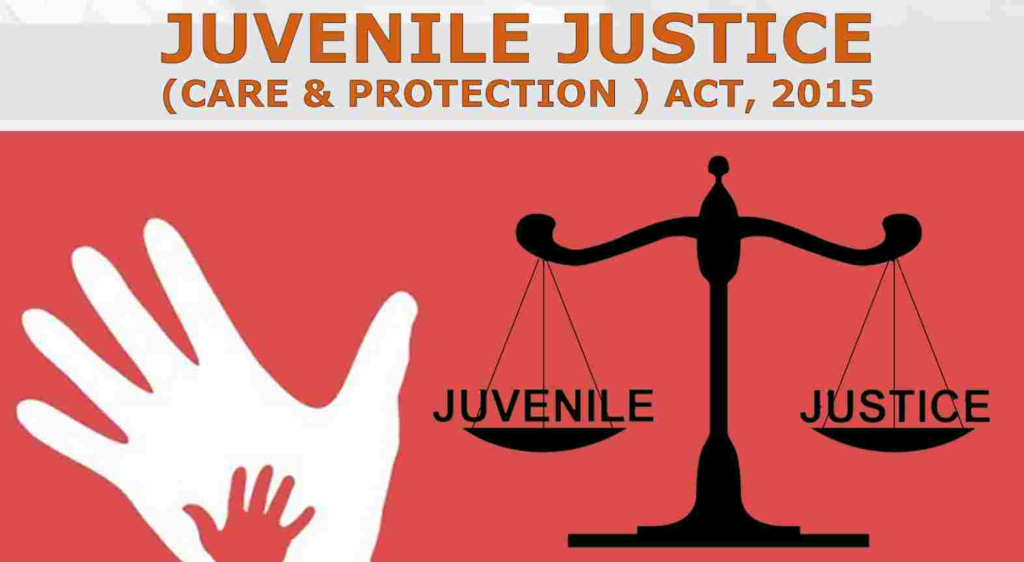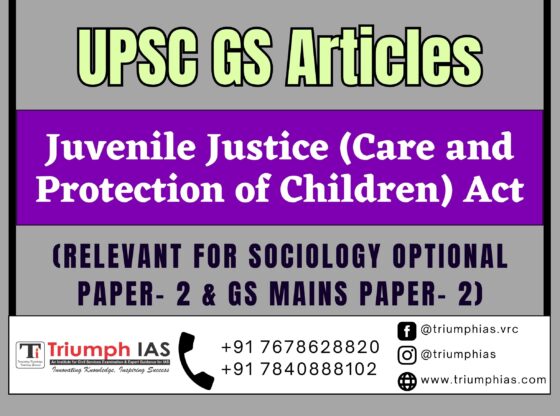Juvenile Justice (Care and Protection of Children) Act
Relevant for sociology optional Paper- 2 & GS Mains Paper- 2

The Juvenile Justice (Care and Protection of Children) Act, commonly known as the Juvenile Justice Act, is a crucial law that was enacted by the Indian Parliament in 2000 to provide a framework for the care, protection, treatment, and rehabilitation of children in conflict with the law. The act recognizes that children who come into conflict with the law are in need of care, protection, and rehabilitation, rather than punishment.
The Juvenile Justice Act defines a juvenile as any person who has not completed eighteen years of age. The act also recognizes that children who come into conflict with the law have special needs and require a different approach to justice than adults.
The Juvenile Justice Act provides for the establishment of Juvenile Justice Boards, which are designated bodies that are responsible for dealing with cases related to children in conflict with the law. These boards are designed to ensure that cases related to children are handled in a manner that is in the best interests of the child.
Under the Juvenile Justice Act, children who are in conflict with the law can be placed in observation homes, special homes, or children’s homes, depending on their age and the nature of the offence. These homes are designed to provide children with care, protection, and rehabilitation, and are intended to be temporary placements until the child can be reintegrated into society.
The Juvenile Justice Act also recognizes the importance of education and skill development for children in conflict with the law. The act provides for the establishment of special schools and vocational training centers for these children, which are designed to provide them with the education and skills they need to lead productive lives.
The Juvenile Justice Act also provides for the establishment of Child Welfare Committees, which are designated bodies that are responsible for dealing with cases related to children in need of care and protection. These committees are designed to ensure that the best interests of the child are always kept in mind.
One of the most significant features of the Juvenile Justice Act is the provision for the reintegration of children who have come into conflict with the law into society. The act recognizes that children who have committed offences are not necessarily criminals, and that they can be rehabilitated and reintegrated into society with the right support and care.
To ensure the successful reintegration of children into society, the Juvenile Justice Act provides for the establishment of aftercare programs. These programs are designed to provide children with the support and assistance they need to reintegrate into society after they leave care.
Despite the positive impact of the Juvenile Justice Act, there are still several challenges that need to be addressed. One of the main challenges is the lack of awareness about the act among children and their families. Many children and families are still unaware of their rights under the act and are therefore unable to access the protection and care they need.
Another challenge is the lack of resources allocated to the implementation of the act. Many states and districts lack the necessary infrastructure and personnel to fully implement the provisions of the act, which has resulted in a lack of care and protection for children in conflict with the law.
Finally, there is a need for greater coordination and cooperation between the various stakeholders involved in the implementation of the act. This includes government agencies, non-governmental organizations, and the judiciary.
In conclusion, the Juvenile Justice (Care and Protection of Children) Act is a crucial law that has played a significant role in ensuring the care, protection, treatment, and rehabilitation of children in conflict with the law in India. The act recognizes that children who come into conflict with the law have special needs and require a different approach to justice than adults. While there are still several challenges that need to be addressed, the act remains an important tool in the protection and care of children in India.
For more such free UPSC notes, Articles, News & Views Join our Telegram Channel. https://t.me/triumphias
Click the link below to see the details about the UPSC – Civils courses offered by Triumph IAS. https://triumphias.com/pages-all-courses.php


